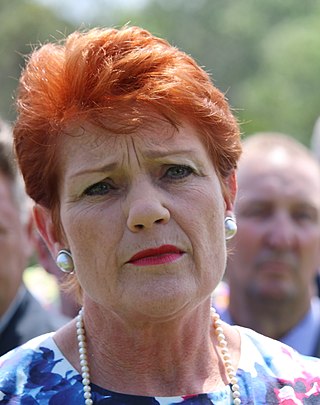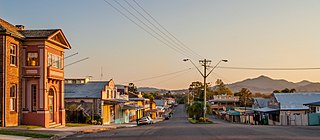Related Research Articles
In jurisprudence, double jeopardy is a procedural defence that prevents an accused person from being tried again on the same charges following an acquittal or conviction and in rare cases prosecutorial and/or judge misconduct in the same jurisdiction. Double jeopardy is a common concept in criminal law – in civil law, a similar concept is that of res judicata. The double jeopardy protection in criminal prosecutions bars only an identical prosecution for the same offence; however, a different offence may be charged on identical evidence at a second trial. Res judicata protection is stronger – it precludes any causes of action or claims that arise from a previously litigated subject matter.

Pauline Lee Hanson is an Australian politician who is the founder and leader of One Nation, a right-wing populist political party. Hanson has represented Queensland in the Australian Senate since the 2016 Federal Election.

The Aboriginal and Torres Strait Islander Commission (ATSIC) (1990–2005) was the Australian Government body through which Aboriginal Australians and Torres Strait Islanders were formally involved in the processes of government affecting their lives, established under the Hawke government in 1990. A number of Indigenous programs and organisations fell under the overall umbrella of ATSIC.

Roger Caleb Rogerson was an Australian detective sergeant in the New South Wales Police Force and a convicted murderer. During his career, Rogerson received at least thirteen awards for bravery, outstanding policemanship and devotion to duty, before being implicated in two killings, bribery, assault and drug dealing, and then being dismissed from the force in 1986.
Australian Story is a national weekly current affairs and documentary style television series which is broadcast on ABC Television. It is produced specifically by the ABC News and Current Affairs Department. The program first aired on 29 May 1996, and since then it has continued to profile various Australian people, typically ones with a diverse background or notable reputation.
Fire-stick farming, also known as cultural burning and cool burning, is the practice of Aboriginal Australians regularly using fire to burn vegetation, which has been practised for thousands of years. There are a number of purposes for doing this special type of controlled burning, including to facilitate hunting, to change the composition of plant and animal species in an area, weed control, hazard reduction, and increase of biodiversity.
David Harold Eastman is a former public servant from Canberra, Australia. In 1995, he was wrongfully convicted of the murder of Australian Federal Police Assistant Commissioner Colin Winchester and was sentenced to life imprisonment without parole. A 2014 judicial inquiry recommended the sentence be quashed and he should be pardoned. On 22 August of the same year, the Supreme Court of the Australian Capital Territory quashed the conviction, released Eastman from prison, and ordered a retrial.
The Caledon Bay crisis refers to a series of killings at Caledon Bay in the Northern Territory of Australia during 1932–34, referred to in the press of the day as Caledon Bay murder(s). Five Japanese trepang fishers were killed by Aboriginal Australians of the Yolngu people. A police officer investigating the deaths, Albert McColl, was subsequently killed. Shortly afterwards, two white men went missing on Woodah Island (with one body found later). With some of the white community alarmed by these events, a punitive expedition was proposed by Northern Territory Police to "teach the blacks a lesson".
Geoff Clark is an Australian Aboriginal politician and activist. Clark led the Aboriginal and Torres Strait Islander Commission (ATSIC) from 1999 until it was disbanded in 2004.
Joseph "Jihad Jack" Terrence Thomas is an Australian citizen who undertook pistol, light firearm and demolition training with Al-Qaeda. Osama Bin Laden visited his training camp three times while he was in attendance and he shook hands with him. He was convicted for receiving funds from Al-Qaeda, which was later overturned on appeal. Thomas, commonly referred to in Australian media as "Jihad Jack", was acquitted of providing resources that would assist in a terrorist act before becoming the first Australian to be placed under a control order under the Australian Anti-Terrorism Act 2005.
An outstation, homeland or homeland community is a very small, often remote, permanent community of Aboriginal Australian people connected by kinship, on land that often, but not always, has social, cultural or economic significance to them, as traditional land. The outstation movement or homeland movement refers to the voluntary relocation of Aboriginal people from towns to these locations.
Alison Nampitjinpa Anderson is an Australian politician.
Robert Richter is an Australian barrister, based in Melbourne. He has handled a number of high-profile cases including defendants unpopular in public opinion. He is an adjunct professor at Victoria University. He is a critic of human rights violations and advocates for the rule of law.
Robbie Williams was the first Indigenous Australian councillor to sit on the Brisbane City Council. He had held the role only since October 2007, but had been tipped to win a seat in the council elections in March 2008. Williams had previously served three terms as a regional councillor with ATSIC and was later the ATSIC commissioner for Brisbane and southeast Queensland. He was widely known for his community work, and was the founder and chair of First Contact Aboriginal Corporation for Youth, an organisation dedicated to improving the lives of indigenous youth, in 1992.
The trial of Lex Wotton relates to the events surrounding the Townsville, Queensland proceedings in the Federal Magistrates Court concerning the actions taken by Palm Island Aboriginal Shire Council member Wotton during the 26 November 2004 Palm Island riots.

The Bowraville murders is the name given to three deaths that occurred over five months from September 1990 to February 1991 in Bowraville, New South Wales, Australia. All three victims were Aboriginal, and all disappeared after parties in Bowraville's Aboriginal community, in an area known as The Mission. A local labourer, who was regarded by police as the prime suspect, was charged with two of the murders but was acquitted following trials in 1994 and 2006. On 13 September 2018, the New South Wales Court of Criminal Appeal decided that the man could not be retried for the murders. On 22 March 2019, the High Court of Australia refused an application by the Attorney General of New South Wales to bring an appeal against that decision.
The Catholic sexual abuse scandal in Victoria is part of the Catholic clerical sexual abuse in Australia and the much wider Catholic sexual abuse scandal in general, which involves charges, convictions, trials and ongoing investigations into allegations of sex crimes committed by Catholic priests and members of religious orders. The Catholic Church in Victoria has been implicated in a reported 40 suicides among about 620 sexual abuse victims acknowledged to the public after internal investigations by the Catholic Church in Victoria.
Child sexual abuse is a matter of concern in Australia, and is the subject of investigation and prosecution under the law, and of academic study into the prevalence, causes and social implications.
The GST distribution dispute is an ongoing political controversy concerning the distribution of goods and services tax (GST) revenue amongst the Australian states and territories and the federal government. The dispute was originally based upon Western Australia's (WA) dissatisfaction with its low returns, which led to reform in 2018. The 2018 reform guarantees all states and territories a minimum return on their contribution.
References
- 1 2 3 Murray McLaughlin (26 June 2003). "ATSIC in crisis in wake of Robinson resignation". The 7:30 Report . Australian Broadcasting Corporation. Retrieved 2 May 2011.
- 1 2 3 Peter George (28 July 2003). "Positions Vacant: Interview with Ray Robinson". Four Corners . Australian Broadcasting Corporation. Retrieved 2 May 2011.
- ↑ Sarah Elks (2 September 2009). "Former ATSIC boss Ray Robinson wins retrial". The Australian . Nationwide News. ISSN 1038-8761 . Retrieved 2 February 2010.
- ↑ Tony Koch; Michael McKenna (15 April 2011). "'Sugar' Ray Robinson $45,000 no-pay order reviewed". The Australian. Nationwide News. ISSN 1038-8761 . Retrieved 2 May 2011.